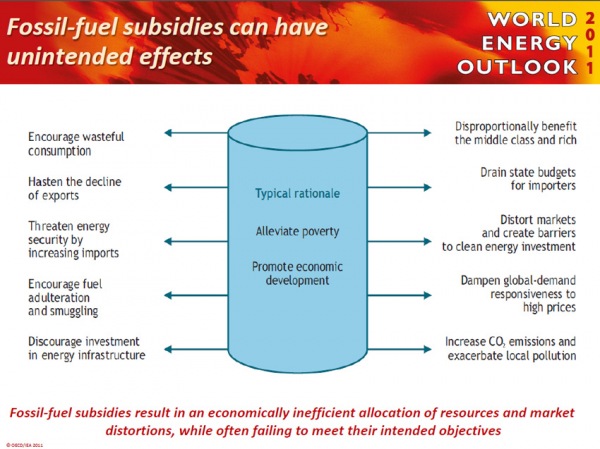Fossil fuel lobby dollars return as subsidies
January 24, 2012
by Ruby Carat
Lester Brown of the Earth Policy Institute advocates changing lightbulbs
to compact fluorescent and implementing design changes in current
architectural models as a partial, and incremental, solution to the
energy fix we’re in. He does not yet realize the potential of the cold
fusion future.
However, he has provided a valuable service in exposing the fossil fuels
lobbying efforts that help to mold policy away from conventional
alternative energies, not to mentions clean cold fusion energy. Mr.
Brown’s recent analysis of International Energy Agency data revealed
that worldwide, “direct fossil fuel subsidies added up to roughly $500
billion in 2010.”
The IEA’s World Energy Outlook
Executive Summary released last November stated “Subsidies that
encourage wasteful consumption of fossil fuels jumped to over $400
billion.” And additional $100 billion is funneled to the
production-side.
Why all the subsidies when demand is so high?
According to The Center for Responsive Politics‘ website
Open
Secrets, oil, gas and electric utilities in the US spent $2.3
billion lobbying their government legislators to support their industry
since 1998.
The top
US spenders on lobbying government legislators for support of
industry-friendly policy actions include these companies:
Company US$ spent lobbying government
General Electric $257,590,000
Exon Mobile $166,722,742
Edison Electric Institute $156,585,999
General Motors $123,679,170
PG&E $119,580,000
Data from Center for Responsive Politics
And what does that lobbying get?
Legislation favorable to the industry, and subsidies.
Altogether, worldwide governments gave an
average $1.5 billion US a day subsidizing fossil fuel industries.
And scrapping fossil fuel subsidies would “avoid 2.56 gigatons of
carbon-dioxide per year by 2035 – that “could provide almost half of the
extra cuts the world needs to stay within its carbon budget” as reported
by the
Washington Post.

Conventional alternative energy, whose financial lobbying is puny
compared to fossil fuel industry, is
increasing its support for Washington DC politics. In response, the
World Energy Outlook clamins “The share of non-hydro renewables in power
generation increases from 3% in 2009 to 15% in 2035, underpinned by
annual subsidies to renewables that rise almost five-times to $180
billion.”
In an early
Ca$h
Flow interview with James Martinez, David J. Nagel described a
5-year program to fund cold fusion research; starting at $20 million a
year, and ramping up to $40 million annually, a pittance compared to the
subsidies for fossil fuels.
An average of $30 million a year for five years to bring cold fusion
research to the next phase, and more importantly, as Professor Nagel
describes, bring a young group of scientists into this field of research
to continue to innovate and drive the next-generation energy for our
planet.
The IEA has not taken into a account the new energy technology based on
cold fusion, and therefore, their forecast is lacking.
What is not lacking is the scenario of dire consequences should we
continue to fund dangerous energy choices, and ignore the solution of
ultra-clean and abundant cold fusion energy.